- Home
- Wendell Berry
Fidelity Page 8
Fidelity Read online
Page 8
There were nights when the sky and all the earth appeared to be on fire, and yet the ground was covered with snow and it was cold.
At Christmas he was among those trapped at Bastogne. He had expected to die, but as before he was spared, though the ground shook and the town burned under a sky brighter than day. They held their own, and others, fighting on the outside, broke through.
“We was mighty glad to see that day when it come,” he thought. “That was a good day.”
The fighting went on, the great tearing apart. People and everything else were torn into pieces. Everything was only pieces put together that were ready to fly apart, and nothing was whole. You got to where you could not look at a man without knowing how little it would take to kill him. For a man was nothing but just a little morsel of soft flesh and brittle bone inside of some clothes. And you could not look at a house or a schoolhouse or a church without knowing how, rightly hit, it would just shake down inside itself into a pile of stones and ashes. There was nothing you could look at that was whole—man or beast or house or tree—that had the right to stay whole very long. There was nothing above the ground that was whole but you had the measure of it and could separate its pieces and bring it down. You moved always in a landscape of death, wreckage, cinders, and snow.
And then, having escaped so far, he was sitting by his artillery piece one afternoon, eating a piece of chocolate and talking to an old redheaded, freckle-faced boy named McBride, and a shell hit right where they were. McBride just disappeared. And a fragment came to Art as if it were his own and had known him from the beginning of the world, and it burrowed into him.
From a man in the light on the outside of the world, he was transformed in the twinkling of an eye into a man in the dark on the inside of himself, in pain, and he thought that he was dead. How long he was in that darkness he did not know. When he came out of it, he was in a place that was white and clean, a hospital, and he was in a long room with many beds. There was sunlight coming in the window.
A nurse who came by seemed glad to see him. “Well, hello, bright eyes,” she said.
He said, “Why, howdy.”
She said, “I think the war is over for you, soldier.”
“Yes, mam,” he said. “I reckon it is.”
She patted his shoulder. “You almost got away from us, you know it?”
And he said, “Yes, mam, I expect I did.”
The uniform he wore as he walked along the road between Jefferson and Hargrave was now too big for him. His shirt collar was loose on his neck, in spite of the neatly tied tie, and under his tightened belt the waistband of his pants gathered in pleats.
He stayed in hospitals while his life grew back around the wound, as a lightning-struck tree will sometimes heal over the scar, until finally they gave him his papers and let him go.
And now, though he walked strongly enough along the road, he was still newborn from his death, and inside himself he was tender and a little afraid.
The bus had brought him as far as the town of Jefferson on the north side of the river, letting him out in the middle of the afternoon in front of the hotel that served also as a bus station. From there, he could have taken another bus to Hargrave had he been willing to wait until the next morning. But now that he was in familiar country he did not have it in him to wait. He had known a many a man who would have waited, but he was old for a soldier; though he was coming from as far as progress had reached, he belonged to an older time. It did not occur to him, any more than it would have occurred to his grandfather, to wait upon a machine for something he could furnish for himself. And so he thanked the kind lady at the hotel desk, shouldered his bag, and set out for home on foot.
The muddy Ohio flowed beneath the bridge and a flock of pigeons wheeled out and back between the bridge and the water, causing him to sway as he walked, so that to steady himself he had to look at the hills that rose over the rooftops beyond the bridge. He went down the long southward arc of the bridge, and for a little while he was among houses again, and then he was outside the town, walking past farmsteads and fields in unobstructed day. The sky was overcast, but the clouds were high.
“It ought to clear off before morning,” he thought. “Maybe it’ll be one of them fine spring days. Maybe it’ll do to work, for I have got to get started.”
They would already have begun plowing, he thought—his father and his brother, Mart. Though they had begun the year without him, they would be expecting him. He could hear his father’s voice saying, “Any day now. Any day.”
But he was between lives. The war had been a life, such as it was, and now he was out of it. The other life, the one he had once had and would have again, was still ahead of him; he was not in it yet.
He was only free. He had not been out in the country or alone in a long time. Now that he had the open countryside around him again and was alone, he felt the expectations of other people fall away from him like a shed skin, and he came into himself.
“I am not under anybody’s orders,” he thought. “What I expect myself to do, I will do it. The government don’t owe me, and I don’t owe it. Except, I reckon, when I have something again that it wants, then I reckon I will owe it.”
It pleased him to think that the government owed him nothing, that he needed nothing from it, and he was on his own. But the government seemed to think that it owed him praise. It wanted to speak of what he and the others had done as heroic and glorious. Now that the war was coming to an end, the government wanted to speak of their glorious victories. The government was made up of people who thought about fighting, not of those who did it. The men sitting behind desks—they spent other men to buy ground, and then they ruined the ground they had and more men to get the ground beyond. If they were on the right side, they did it the same as them that were on the wrong side.
“They talk about victory as if they know all them dead boys was glad to die. The dead boys ain’t never been asked how glad they was. If they had it to do again, might be they wouldn’t do it, or might be they would. But they ain’t been asked.”
Under the clouds, the country all around was quiet, except for birds singing in the trees, wherever there were trees, and now and then a human voice calling out to a team. He was glad to be alive.
He had been glad to be alive all the time he had been alive. When he was hit and thought he was dead, it had come to him how good it was to be alive even under the shelling, even when it was at its worst. And now he had lived through it all and was coming home. He was now a man who had seen far places and strange things, and he remembered them all. He had seen Kansas and Louisiana and Arizona. He had seen the ocean. He had seen the little farms and country towns of France and Belgium and Luxembourg—pretty, before they were ruined. For one night, he was in Paris.
“That Paris, now. That was something. We was there one day and one night. There was wine everywheres, and these friendly girls who said, ‘Kees me.’ And I don’t know what happened after about ten o’clock. I come to the next morning in this hotel room, sick and broke, with lipstick from one end to the other. I reckon I must have had a right good time.”
At first, before he was all the way in it, there was something he liked about the war, a reduction that in a way was pleasing. From a man used to doing and thinking for himself, he became a man who did what he was told.
“That laying around half a day, waiting for somebody else to think—that was something I had to learn.”
It was fairly restful. Even basic training tired him less than what he would ordinarily have done at that time of year. He gained weight.
And from a man with a farm and crops and stock to worry about, he became a man who worried only about himself and the little bunch of stuff he needed to sleep, dress, eat, and fight.
He furnished only himself. The army furnished what little else it took to make the difference between a man and a beast. More than anything else, he liked his mess kit. It was all the dishes a man really
needed. And when you weren’t cooking or eating with it, you could keep things in it—a little extra tobacco, maybe.
“When I get to Ellville,” he thought, “I won’t be but mighty little short of halfway. I know the miles and how they lay out end to end.”
It had been evening for a while now. On the farmsteads that he passed, people were busy with the chores. He could hear people calling their stock, dogs barking, children shouting and laughing. On one farm that he passed, a woman, a dog, and a small boy were bringing in the cows; in the driveway of the barn he could see a man unharnessing a team of mules. It was as familiar to him as his breathing, and because he was outside it still, he yearned toward it as a ghost might. As he passed by, the woman, perhaps because he was a soldier, raised her hand to him, and he raised his own in return.
After a while, he could see ahead of him the houses and trees of Ellville, and over the trees the superstructure of the bridge arching into Hargrave. Throughout his walk so far, he had been offering himself the possibility that he would walk on home before he would sleep. But now that he had come nearly halfway and Ellville was in sight, he knew he would not go farther that day. He was tired, and with his tiredness had come a sort of melancholy and a sort of aimlessness, as if, all his ties cut, he might go right on past his home river and on and on, anywhere at all in the world. The little cluster of buildings ahead of him now seemed only accidentally there, and he himself there only accidentally. He had arrived, as he had arrived again and again during the healing of his wound, at the apprehension of a pure emptiness, as if at the center of an explosion—as if, without changing at all, he and the town ahead of him and the village around him and all the long way behind him had been taken up into a dream in which every creature and every thing sat, like old McBride, in the dead center of the possibility of its disappearance.
In the little town a lane turned off the highway and went out beyond the houses and across the river bottom for perhaps a quarter of a mile to a barn and, beyond the barn, to a small weatherboarded church. It was suppertime then; the road and the dooryards were deserted. Art entered the lane and went back past the gardens and the clutter of outbuildings that lay behind the houses. At the barn there was a cistern with a chain pump. He set down his bag and pumped and drank from his cupped left hand held under the spout.
“Looks like I ought to be hungry,” he thought. “But I ain’t.”
He was not hungry, and there was no longer anything much that he wanted to think. He was tired. He told himself to lift the bag again and put it on his shoulder. He told his feet to walk, and they carried him on to the church. The door was unlocked. He went in.
He shut the door behind him, not allowing the latch to click. The quiet inside the church was palpable; he came into it as into a different element, neither air nor water. He crossed the tiny vestibule where a bell rope dangled from a worn hole in the ceiling, went through another door that stood open, and sat down on the first bench to his left, leaving his duffel bag in the aisle, propped against the end of the bench. He let himself become still.
“I will eat a little,” he thought, “’gainst I get hungry in the night.”
After a while he took a bar of candy from the bag and slowly ate it. The church windows were glazed with an amber-colored glass that you could not see through, and though it was still light outdoors, in the church it was dusk. When he finished the candy, he folded the wrapper soundlessly and put it in his pocket. Taking his overcoat from the bag to use as a blanket, he lay down on the bench. Many thoughts fled by him, none stopping. And then he slept.
He woke several times in the night, listening, and, hearing no threat out in the darkness anywhere, slept again. The last time he woke, roosters were crowing, and he sat up. He sat still a while in the dark, allowing the waking quiet of the place to come over him, and then he took another bar of candy from his bag and ate it and folded the wrapper and put it in his pocket as before. The night chill had seeped into the church; standing, he put on the overcoat. He picked up his bag and felt his way to the door.
It had cleared and the sky was full of stars. To the east, upriver, he could see a faint brightening ahead of the coming day. All around him the dark treetops were throbbing with bird song, and from the banks of the two rivers at their joining, from everywhere there was water, the voices of spring peepers rose as if in clouds. Art stood still and looked around him and listened. It was going to be the fine spring day that he had imagined it might be.
He thought, “If a fellow was to be dead now, and young, might be he would be missing this a long time.”
There was a privy in back of the church and he went to it. And then, on his way out of the lane, he stopped at the barn and drank again at the cistern.
Back among the houses, still dark and silent among their trees, he took the road that led up into the smaller of the two river valleys. There was no light yet from the dawn, but by the little light of the stars he could see well enough. All he needed now was the general shape of the place given by various shadows and loomings.
“I have hoofed it home from here a many a night,” he thought. “Might be I could do it if I was blind. But I can see.”
He could see. And he walked along, feeling the joy of a man who sees, a joy that a man tends to forget insufficient light. The quiet around him seemed wide as the whole country and deep as the sky, and the morning songs of the creatures and his own footsteps occurred distinctly and separately in it, making a kind of geography and a kind of story. As he walked the light slowly strengthened. As he more and more saw where he was, it seemed to him more and more that he was walking in his memory or that he had entered, awake, a dream that he had been dreaming for a long time.
He was hungry. The candy bar that he had eaten when he woke had hardly interrupted his hunger.
“My belly thinks my throat has been cut. It is laying right flat against my backbone.”
It was a joy to him to be so hungry. Hunger had not bothered him much for many weeks, had not mattered, but now it was as vivid to him as a landmark. It was a tree that put its roots into the ground and spread its branches out against the sky.
The east brightened. The sun lit the edges of a few clouds on the horizon and then rose above them. He was walking full in its light. It had not shone on him long before he had to take off the overcoat, and he folded and rolled it neatly and stuffed it into his bag. By then he had come a long way up the road.
Now that it was light, he could see the marks of the flood that had recently covered the valley floor. He could see drift logs and mats of cornstalks that the river had left on the low fields. In places where the river ran near the road, he could see the small clumps of leaves and grasses that the currents had affixed to the tree limbs. Out in one of the bottoms he saw two men with a team and wagon clearing the scattered debris from their fields. They had set fire to a large heap of drift logs, from which the pale smoke rose straight up. Above the level of the flood, the sun shone on the small, still-opening leaves of the water maples and on the short new grass of the hillside pastures.
As he went along, Art began to be troubled about how to present himself to the ones at home. He had not shaved. Since before his long ride on the bus he had not bathed. He did not want to come in, after his three years’ absence, like a man coming in from work, unshaven and with his clothes mussed and soiled. He must appear to them as what he had been since they saw him last, a soldier. And then he would be at the end of his soldiering. He did not know yet what he would be when he had ceased to be a soldier, but when he had thought so far his confusion left him.
He came to where the road crossed the mouth of a small tributary valley. Where the stream of that valley passed under the road, he went down the embankment, making his way, first through trees and then through a patch of dead horseweed stalks, to the creek. A little way upstream he came to a place of large flat rocks that had been swept clean by the creek and were now in the sun and dry. Opening the duffel bag, he
carefully laid its contents out on the rocks. He took out his razor and brush and soap and a small mirror, and knelt beside the stream and soaped his face and shaved. The water was cold, but he had shaved with cold water before. When he had shaved, he took off his clothes and, standing in flowing water that instantly made his feet ache, he bathed, quaking and breathing between his teeth as he raised the cold water again and again in his cupped hands.
Standing on the rocks in the sun, he dried himself with the shirt he had been wearing. He put on his clean, too-large clothes, tied his tie, and combed his hair. And then warmth came to him. It came from inside himself and from the sun outside; he felt suddenly radiant in every vein and fiber of his body. He was clean and warm and rested and hungry. He was well.
He was in his own country now, and he did not see anything around him that he did not know.
“I have been a stranger and have seen strange things,” he thought. “And now I am where it is not strange, and I am not a stranger.”
He was sitting on the rocks, resting after his bath. His bag, repacked, lay on the rock beside him and he propped his elbow on it.
“I am not a stranger, but I am changed. Now I know a mighty power that can pass over the earth and make it strange. There are people, where I have been, that won’t know their places when they get back to them. Them that live to get back won’t be where they were when they left.”
He became sleepy and he lay down on the rock and slept. He slept more deeply than he had in the night. He dreamed he was where he was, and a great, warm light fell upon that place, and there was light within it and within him.
When he returned to the road after his bath and his sleep, it was past the middle of the morning. His steps fell into their old rhythm on the blacktop.
“I know a mighty power,” he thought. “A mighty power of death and fire. An anger beyond the power of any man, made big in machines equal to many men. And a little man who has passed through mighty death and fire and still lived—what is he going to think of himself when he is back again, walking the river road below Port William, that we would have blowed all to flinders as soon as look at it if it had got in our way?”

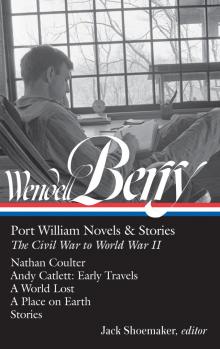 The Selected Poems of Wendell Berry
The Selected Poems of Wendell Berry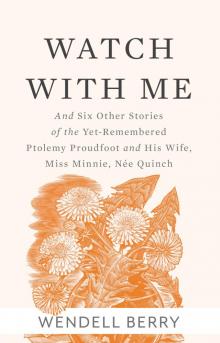 Watch With Me
Watch With Me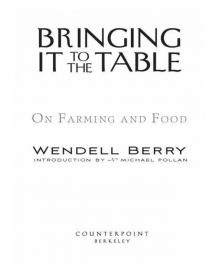 Bringing It to the Table: On Farming and Food
Bringing It to the Table: On Farming and Food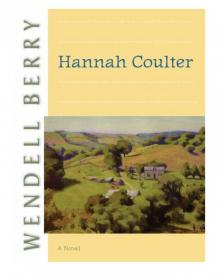 Hannah Coulter
Hannah Coulter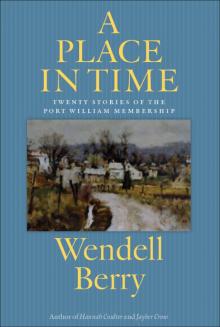 A Place in Time: Twenty Stories of the Port William Membership
A Place in Time: Twenty Stories of the Port William Membership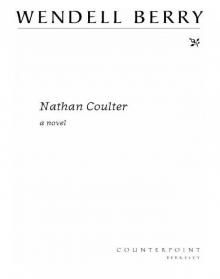 Nathan Coulter
Nathan Coulter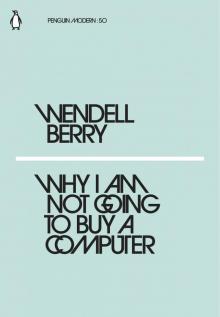 Why I Am Not Going to Buy a Computer
Why I Am Not Going to Buy a Computer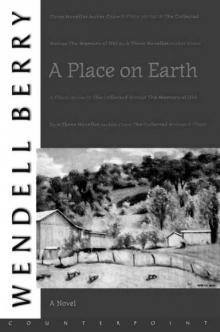 A Place on Earth
A Place on Earth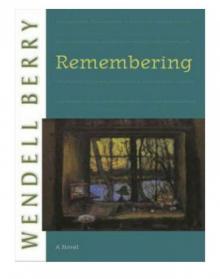 Remembering
Remembering New Collected Poems
New Collected Poems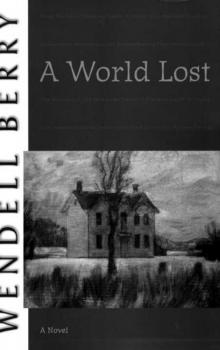 A World Lost
A World Lost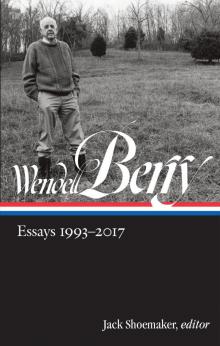 Wendell Berry
Wendell Berry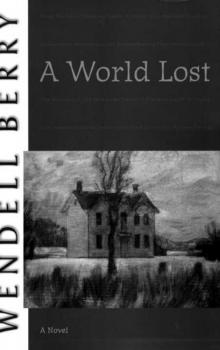 A World Lost: A Novel (Port William)
A World Lost: A Novel (Port William)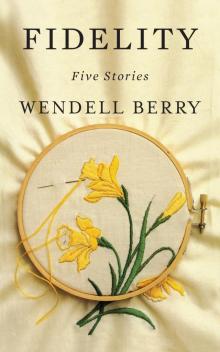 Fidelity
Fidelity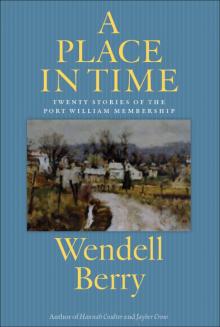 A Place in Time
A Place in Time